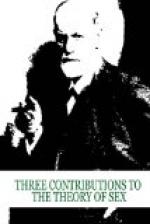its future intensity. She considers her actions
as asexually “pure” love, for she carefully
avoids causing more irritation to the genitals of the
child than is indispensable in caring for the body.
But as we know the sexual impulse is not awakened
by the excitation of genital zones alone. What
we call tenderness will some day surely manifest its
influence on the genital zones also. If the mother
better understood the high significance of the sexual
impulse for the whole psychic life and for all ethical
and psychic activities, the enlightenment would spare
her all reproaches. By teaching the child to
love she only fulfills her function; for the child
should become a fit man with energetic sexual needs,
and accomplish in life all that the impulse urges the
man to do. Of course, too much parental tenderness
becomes harmful because it accelerates the sexual
maturity, and also because it “spoils”
the child and makes it unfit to temporarily renounce
love or be satisfied with a smaller amount of love
in later life. One of the surest premonitions
of later nervousness is the fact that the child shows
itself insatiable in its demands for parental tenderness;
on the other hand, neuropathic parents, who usually
display a boundless tenderness, often with their caressing
awaken in the child a disposition for neurotic diseases.
This example at least shows that neuropathic parents
have nearer ways than inheritance by which they can
transfer their disturbances to their children.
Infantile Fear.—The children themselves
behave from their early childhood as if their attachment
to their foster-parents were of the nature of sexual
love. The fear of children is originally nothing
but an expression for the fact that they miss the
beloved person. They therefore meet every stranger
with fear, they are afraid of the dark because they
cannot see the beloved person, and are calmed if they
can grasp that person’s hand. The effect
of childish fears and of the terrifying stories told
by nurses is overestimated if one blames the latter
for producing the fear in children. Children who
are predisposed to fear absorb these stories, which
make no impression whatever upon others; and only
such children are predisposed to fear whose sexual
impulse is excessive or prematurely developed, or has
become exigent through pampering. The child behaves
here like the adult, that is, it changes its libido
into fear when it cannot bring it to gratification,
and the grown-up who becomes neurotic on account of
ungratified libido behaves in his anxiety like a child;
he fears when he is alone, i.e., without a
person of whose love he believes himself sure, and
who can calm his fears by means of the most childish
measures.[7]




